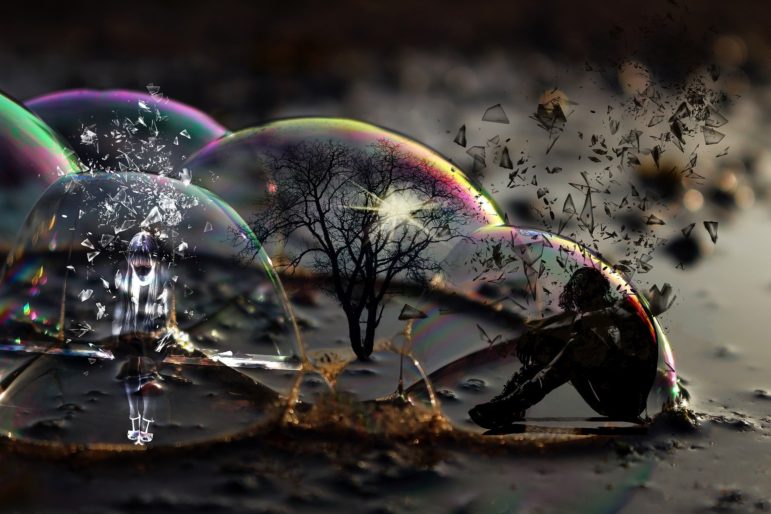TWH – One of the broadly felt repercussions of the Covid-19 pandemic and the accompanying shelter-at-home orders is the impact that the lack of in-person classrooms and other forms of child care is having—both on children and their parents.

Pixabay
Resources like the New York Times and Slate’s sections on parenting have become go-to’s for overtaxed caregivers, with parents declaring that the stresses have made them ‘give up’ in favor of just trying to survive. Others warn that ‘the parents are not ok’ and feel stretched beyond reasonable limits, pointing exasperatedly at a system that is not cohesively built around humans but rather, cobbled together in spite of them. And while health experts across the nation recognize and are offering coping suggestions, there’s a sense that those very systemic problems are still being ignored.
And while some parents are able to work from home, it doesn’t alleviate the need to be present for children, in terms of general supervision as well as online learning that is supposed to be happening. This burden seems to felt be much more acutely by mothers–and those who have to work outside the home–exponentially more so.
But the lives and mental well-being of children are also greatly impacted by the changes to their routines, social lives, and loss of milestones like sporting events, band performances, proms, and graduations. Some schools have even held or will hold virtual graduation events this year to honor the occasion.
Parents and children in the Pagan community are not immune from the effects, either. We interviewed a clinical neuropsychologist, some parents and children about how they’re coping. Generally, the majority said that while it has been stressful, they were coping well but all pointed to long-term concerns as the need to socially distance and isolate has built from weeks into months and looks ahead to the possibility of a year (or more).
“Currently, I deal with more than 100 teens/week specifically about their emotional response to Covid-19. The adolescent years are a turbulent time without a pandemic. Add the toxic stress of quarantine and young minds become a playground for trauma and stress disorders,” said Arawn Machia, PhD, EdD. Machia is a Clinical Neuropsychologist who specializes in adolescent trauma and behavioral and mental disorders.
Machia says that young people are less equipped to deal with the stresses and trauma that they’re experiencing because they have less lived-experience in general. He says the individuals that he sees are hearing about the upheaval and death that the pandemic is causing and “higher-level thinking all but disappears and is replaced by primal reactions to the new unfamiliar stimuli… i.e. fight or flight.”
“This may manifest as yelling, verbal aggression, withdrawal, passive-aggressiveness, emotional distancing, and a plethora of other coping mechanisms familiar to the teenager. Adults may pass this off as youthful disrespect, but it is much more detrimental in that it can become the youth’s ‘go-to’ response in times of stress long after the pandemic fades,” he said.

Pixabay
Many parents expressed that a lack of actual in-person contact with their peers was making this experience particularly tough, including some discipline issues.
“My son is a very social creature, and he thrives and shines when he has his friends around. He brightens up around his friends and the best parts of his character shine through. But lately, he seems a bit deflated to me,” said Sirona, who has been self-isolating with her son and her husband, who still has to go to work each day.
“We argue about chores and homework – which is par for the course with teenagers, but this feels different. His primary outlet, daily contact with his peers, has been taken.”
Still, social media, chat apps, virtual hangouts, and multiplayer video games are a lifeline even for those who would rather gather in person. Sirona’s son connects with his best friend and older brother, who lives in another state, via games, and on the Discord chat platform.
Acquisition editor for Llewellyn Worldwide and former Wild Hunt managing editor, Heather Greene, has been sheltering at home with one other adult and four children. She said that her children are also taking advantage of different wireless clients for staying in touch, “but it is no substitute for seeing friends at school, meeting them at the movies, or hanging out at each other’s homes.”
Greene said that she sees the interactions that teens have with one another as indispensable to their growth into adulthood.
“The interactions among teens, while they may scare the best of us parents, are essential for their growth and how they learn to socialize and be adults. They teach each other lessons that adults can’t teach,” she said.
Still, Greene said she recognizes that her children are lucky, a perspective she says she tries to cultivate among everyone in her home.
Rachel from Coral Springs, Florida, who preferred to have just her first name used, said that her children have been taking things pretty well.
“As long as they have their computers, they are able to connect with their friends through the computer and play games,” she said. And while she admits that they’re probably on too much, she can’t imagine other parents aren’t in the same situation.
Rachel’s 13-year-old daughter said that she visits with friends online frequently but she’s skeptical about when she may get to see them again.
“I think a vaccine needs to be put in place before we can even begin to think about going back to ‘normal,’” she said.
Thanks in part to the cost of tuition and eye-popping rents across the country some kids are choosing to stay at home while continuing their higher education.
Laura Perry, founder, and lead facilitator for Modern Minoan Paganism, has a 20-year-old daughter who falls into this category. She says this experience has been hard on her daughter and calls the social distancing a lonely experience for her.
“I can see how the whole situation has really shaken her. She’s old enough to understand the broader implications of the systemic problems the pandemic is revealing, so suddenly the world isn’t the way she thought it was. We all go through a certain amount of disillusionment as we reach adulthood, but in this situation, it’s especially difficult, like the whole world is falling apart.”
Perry’s daughter expressed fears about the future of her desired degree in biology, which requires lots of lab hours and on-campus learning. Still, she voiced exasperation at the calls for opening up the economy which she felt has been premature.

Pixabay
When asked about how she viewed the future for herself and the country she said, “I feel more optimistic about the distant future, years from now, since the pandemic has forced us to identify major flaws in our world. However, those flaws are currently harming if not killing thousands of people, as well as disrupting everyday life for everyone, so I feel much less optimistic about the immediate future. The sooner we figure out solutions, the better.”
Pagans may have some inherent advantages to pass on to our children, by pure dint of our traditions.
“It’s really easy to social distance in nature, and the experience is restorative,” Machia said, and also reminds that many of the deities from different traditions went through periods of isolation themselves. Myths which may be useful for providing strength to carry on.
“Let your children know that you sometimes get worried, but only when you forget the reality that we’ll get past this. Tell them that sometimes you have to tell yourself to stop catastrophizing and be positive. And then be positive for them,” he said.
“Our nation has bounced back from pandemics and recessions more than once, and we will do it again,” he added. “Don’t indulge in your own despondency and remember that you behavior is a guide to your children on how to react in tough times,” he said.
“You can view this as a rebirth or armageddon; the choice is yours… and so are the outcomes. What you feed grows; what you starve dies. Speak affirmations. Feed the positive.”
The Wild Hunt is not responsible for links to external content.
To join a conversation on this post:
Visit our The Wild Hunt subreddit! Point your favorite browser to https://www.reddit.com/r/The_Wild_Hunt_News/, then click “JOIN”. Make sure to click the bell, too, to be notified of new articles posted to our subreddit.
